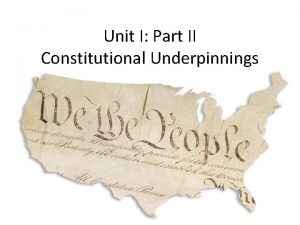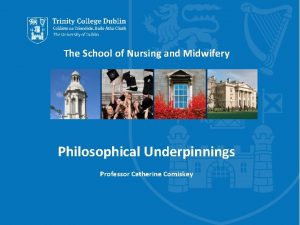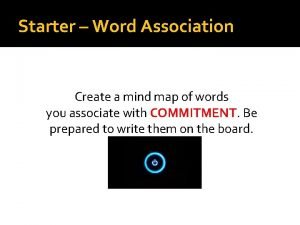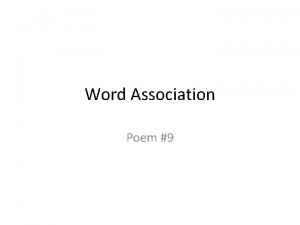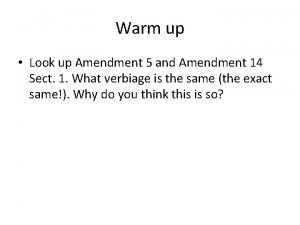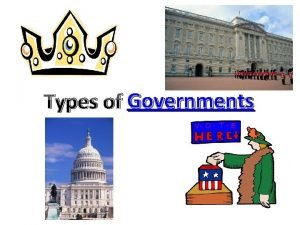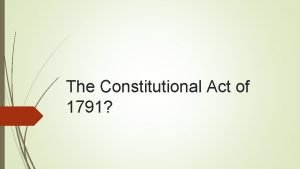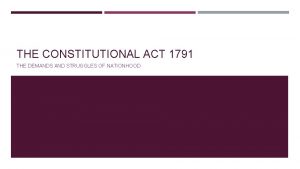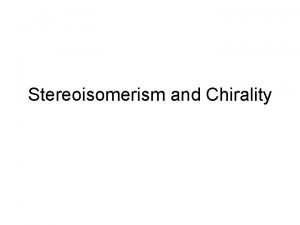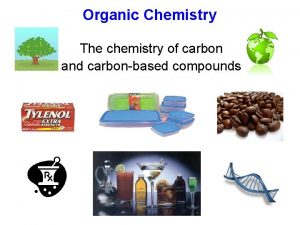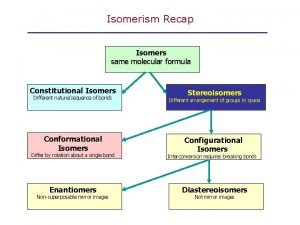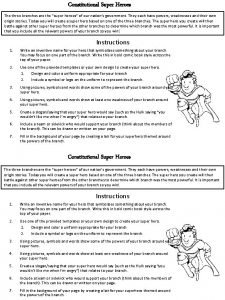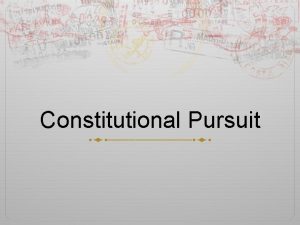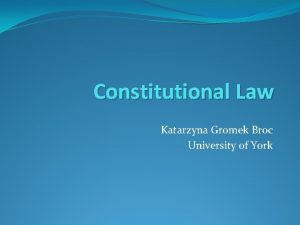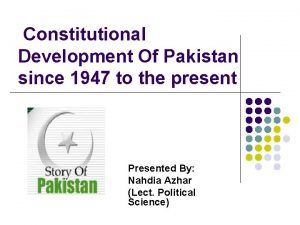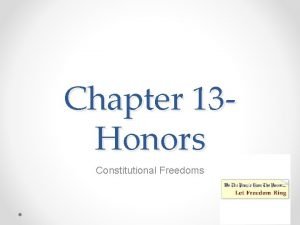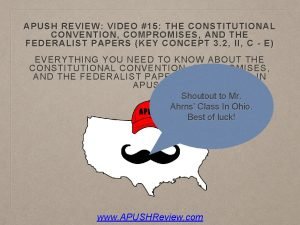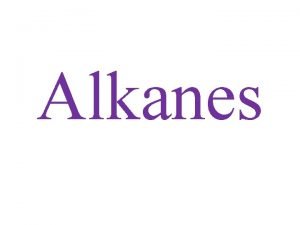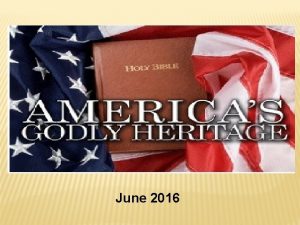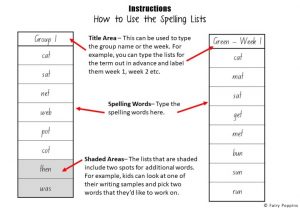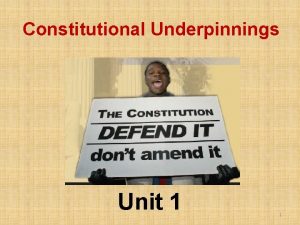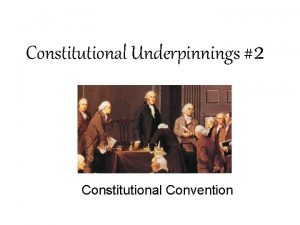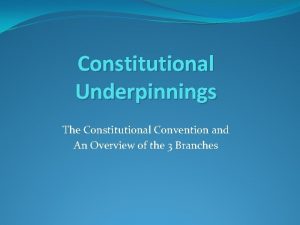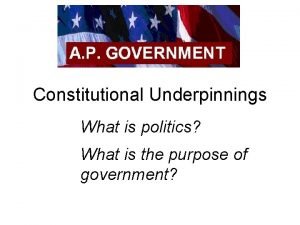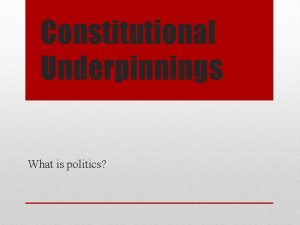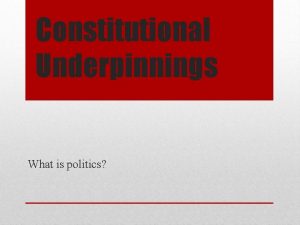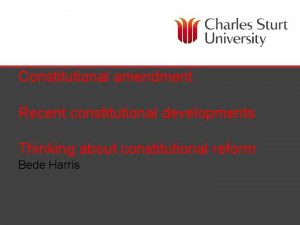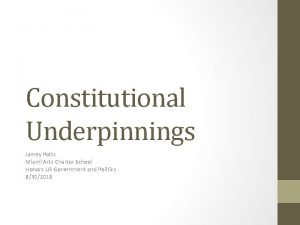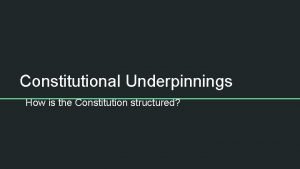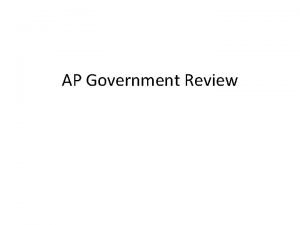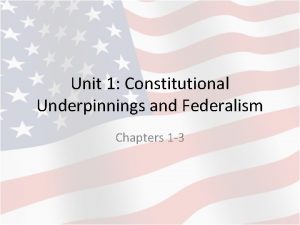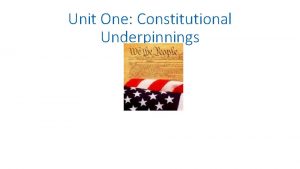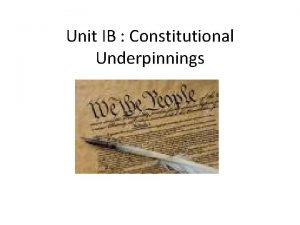Constitutional Underpinnings What is politics Word Association What



















- Slides: 19

Constitutional Underpinnings What is politics?

Word Association • What words come to mind when you hear the word “politics”? • Does the word have a more positive or negative connotation?

Machiavelli • Machiavelli’s name is synonymous with tough and dirty politics • Author of The Prince. One of history’s first political scientists.

Machiavelli Quotes • “The ends justify the means. ” • “It is better to be feared than loved. ” • “By no means can a prudent ruler keep his word. Because all men are bad and do not keep promises to you, you likewise do not have to keep your promises to them. ”

Can we be hopeful about politics? Forward “I know what it takes”

A neutral view of politics Harold D. Lasswell • Who gets what, when, and how. (and where) • All of us are political, we’re just not used to calling it that. You don’t have to take a class to get politics. Aristotle was correct when he wrote, “Man is by nature a political animal. ”

State of Nature game • Why were teams successful? Was it strategy or an unfair advantage? • How would the outcome be different if teams were not allowed to attack, only invest?

Social Contract Theory • “The only valid government is one based on the consent of the governed. ” - Locke • Rulers and citizens enter into an agreement, or a social contract • Government by the people, masses

Locke’s influence on the US • “A state also of equality, wherein all the power and jurisdiction is reciprocal, no one having more than another… - John Locke, of Civil Government • “We hold these truths to be self-evident: That all men are created equal. ” Thomas Jefferson, Declaration of Independence

Political Power • Power – ability of one person to cause another person to act in accordance • Authority – right to use power • Legitimacy – what makes the law or leader a source of “right”

What makes a Democracy? Principles necessary for a democracy to exist. 1. Universal suffrage (everyone vote) 2. Political Equality (all votes counted equally) 3. Majority Rule 4. Government responds to public opinion

Can uneducated/poor people be trusted? • Direct Democracy – citizens create/vote on laws • Problems 1. Impractical for reasons of time, expertise • How do you get 300 million people to vote multiple times per day on issues they no nothing about? 2. Masses of people make unwise decisions based on emotions (Hitler was elected) • “The masses are turbulent and changing and seldom judge or determine right. ” -Alexander Hamilton People can be like a Willow tree swaying in the wind

Representative Democracy (Republic) • Citizens elect representatives • Gov’t MEDIATES popular views – “Will of the people” ≠ “Common interest” – EX. Lower gas prices, minority rights • Reps are educated on issues at hand • Prevents fast, sweeping change • Minority rights more likely to be protected

Theories explaining how democracies ACTUALLY function 1. Majoritarian Theory 2. Pluralist Theory = leaders are forced to follow the wishes of the people because majority rules = groups compete and compromise with each other to get the gov’t to do what they want 3. Elite Theory 4. Bureaucratic Theory = groups or people who possess = appointed officials dominate the most more power (money or gov’t through unelected jobs influence) dominate gov’t

Democracy Theory Test What theory is supported by the fact that… 1. The US holds mainly elections where the person who receives the most votes wins. 2. Most US representatives are upper class people. 3. The President appoints hundreds of people for gov’t jobs or judgeships, all have special powers. 4. Interest groups spend millions of dollars toward campaigns of favored candidates. 5. Gov’t can call for referendums, or votes by the people to pass or strike down potential laws. 6. The candidate who raises the most money for an election almost always wins.

Pluralism 1. 2. 3. 4. Modern society consists of many groups (ex. Economic, religious, cultural, ethnic. ) that compete with each other to achieve goals Groups that influence gov’t, work hard, and have largest membership get what they want Even if the average citizen does not keep up with politics, their interests will be protected by their group. Groups must COMPROMISE to

Arguments for and against the Pluralist view FOR AGAINST • Relatively low numbers of • There is no unified people join interest groups. majority in the US that always acts together. • Poor citizens have less opportunity to join interest • Gov’t leaders must groups or contribute to them. please groups to gain votes and money to be • One can’t assume that reelected. group decisions are always in the best interest of the • Groups must compete nation. for gov’t services and favorable laws.

Marxist Theory (Elite) • Control the economic system = control the political system. • Politicians require massive funding to win elections, and rely on corporations to supply them.

A Reminder… • These are only theories. They are people’s perception of our democracy and the way it functions. • Which theory is correct? ? ? – Pluralist – most popular today – Majoritarian – popular pre-1950’s – Elite – rising since the 80’s (Michael Moore) – Bureaucratic – gov’t spending more than ever before just to run itself
 Constitutional underpinnings definition
Constitutional underpinnings definition Philosophical underpinnings of nursing
Philosophical underpinnings of nursing Mind map your word association with the word snowball
Mind map your word association with the word snowball Word association examples tagalog
Word association examples tagalog Procedural vs substantive due process
Procedural vs substantive due process Constitutional monarchy pros and cons
Constitutional monarchy pros and cons Constitutional act of 1791
Constitutional act of 1791 Constitutional act 1791
Constitutional act 1791 Constitutional isomer
Constitutional isomer Right to constitutional remedies
Right to constitutional remedies Methyl pentane
Methyl pentane Constitutional isomers
Constitutional isomers Branches of government superhero
Branches of government superhero Constitutional pursuit answer sheet
Constitutional pursuit answer sheet Katarzyna gromek-broc
Katarzyna gromek-broc Constitutional development in pakistan from 1947 to 1973
Constitutional development in pakistan from 1947 to 1973 Gitlow v new york constitutional question
Gitlow v new york constitutional question Constitutional convention apush
Constitutional convention apush 5 isomers of hexane
5 isomers of hexane Constitutional convention 1787
Constitutional convention 1787
